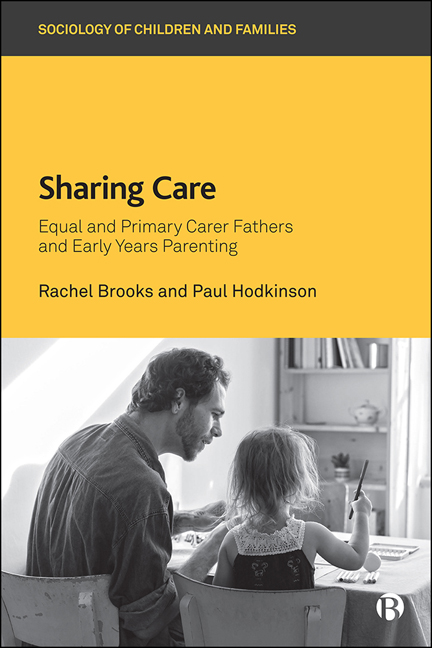Book contents
- Frontmatter
- Dedication
- Contents
- Acknowledgements
- 1 Sharing Care: An Introduction
- 2 Extended Fatherly Involvement: Development and Understandings
- 3 Developing Policy Support for Care-sharing: And its Limitations
- 4 Shifting Care Horizons: Care-sharing Arrangements, Motivations and Transitions
- 5 Developing Fatherly Roles and Identities: Towards Parental Equivalence?
- 6 Daytime Social Isolation from Other Parents
- 7 Care-sharing Futures
- Appendix: Table of Participants
- References
- Index
6 - Daytime Social Isolation from Other Parents
Published online by Cambridge University Press: 11 March 2021
- Frontmatter
- Dedication
- Contents
- Acknowledgements
- 1 Sharing Care: An Introduction
- 2 Extended Fatherly Involvement: Development and Understandings
- 3 Developing Policy Support for Care-sharing: And its Limitations
- 4 Shifting Care Horizons: Care-sharing Arrangements, Motivations and Transitions
- 5 Developing Fatherly Roles and Identities: Towards Parental Equivalence?
- 6 Daytime Social Isolation from Other Parents
- 7 Care-sharing Futures
- Appendix: Table of Participants
- References
- Index
Summary
Introduction
Interactions with other parents have long comprised a core part of the daily routine of many mothers who are primary caregivers for young children (Doucet, 2006a). Attendance at organised parent and infant events, children's activities and a range of more informal gatherings in parks, shopping centres, cafes and in one another's houses forms a key element of what Doucet (2006a) refers to as ‘community responsibility’ for the upbringing of children, while also offering crucial sources of company and support, not least in the first year of babies’ lives (Mulcahy et al., 2010). Indeed, such activities and connections, argues Doucet, can form a key facet of contemporary mothering (Doucet, 2006a). As we have outlined in Chapter 2, however, research has suggested that fathers who care for children alone on weekdays may engage less with such spaces and networks and that, when they do, reactions to them can be less than positive (Doucet, 2006a; Merla, 2008; Snitker, 2018) – with potential implications for the extent of the parental responsibilities they are taking on, their own wellbeing and comfort within their role, and the prospects of longer-term commitment to it.
In the previous chapter, we argued that networking with other parents was one area in which differences between mothers and fathers continued to be played out among our sample of men who, in many other respects, had embraced interchangeable approaches to parenting. In this final empirical chapter, we examine the challenges fathers faced in these respects in greater detail, outlining how they often felt out of place within daytime spaces, their difficulties interacting with other parents, and the apparent isolation many were subject to on the days they cared for their children alone. Comparing our findings with existing literature (for example Doucet, 2006a; Ranson, 2010; Solomon, 2017), we explore the reasons why caregiving fathers tend to stay at home alone with their children and the implications for their own wellbeing and for the prospects of broader take-up by men of shared care arrangements. While fathers themselves commonly individualised the issue by putting their isolation down to their own introverted nature, our analysis suggests more collective and structural factors were at play.
- Type
- Chapter
- Information
- Sharing CareEqual and Primary Carer Fathers and Early Years Parenting, pp. 145 - 172Publisher: Bristol University PressPrint publication year: 2020



